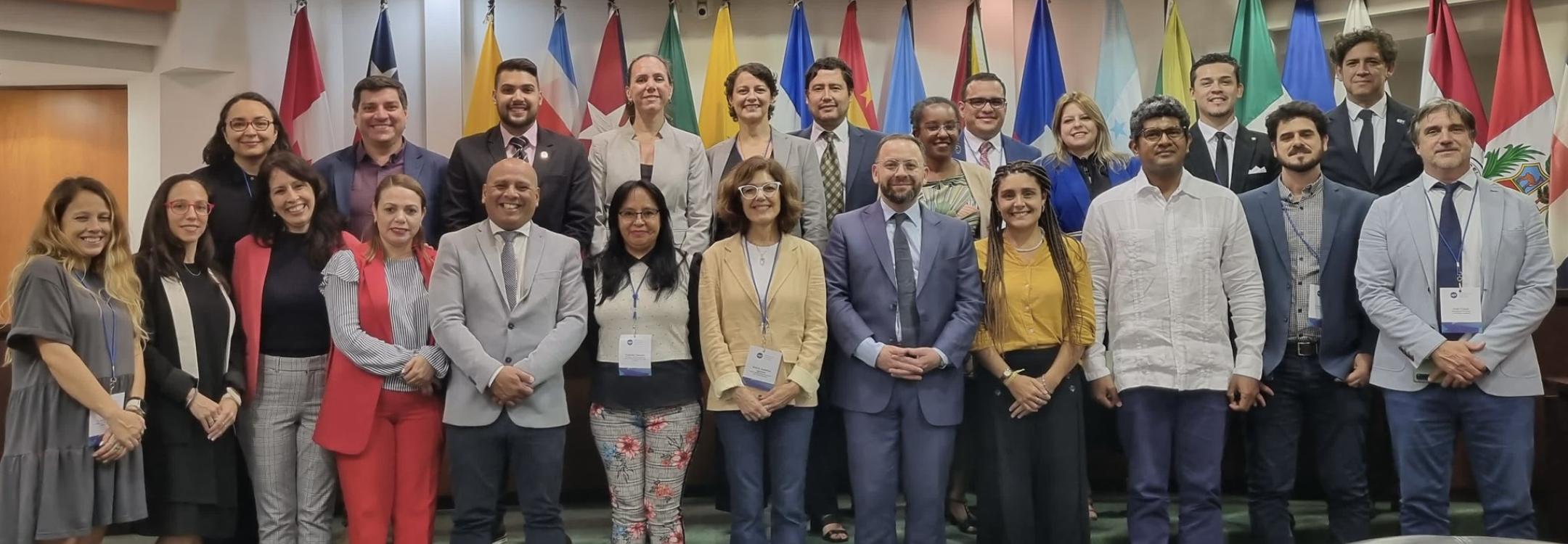
National Preventive Mechanisms from Latin America met for a ‘Regional Meeting of National Mechanisms for the Prevention of Torture: Progress and Challenges of the implementation of OPCAT in Latin America’ was held from 7 to 10 May 2024.
Gathered in San José, Costa Rica, for a four-day Regional Meeting led by the Association for the Prevention of Torture, 14 National and Local Preventive Mechanisms from ten Latin American countries took part in an in-depth program of dialogues, delving into different topics relating to their working processes, new preventive agendas and growing contextual challenges to perform a preventive mandate concerning human rights abuses against people deprived of liberty.
Almost 20 years after the Optional Protocol to the Convention Against Torture entered into force in 2006, Latin America holds a robust and innovative network of National Preventive Mechanisms. Such bodies have been designated in 17 countries around the Region – covering 85% of it. From ratification to the implementation of OPCAT by the States parties, APT has been partnering with State bodies and civil society across the Region to foster NPMs’ capacities and independence to inhibit torture and ill-treatment.
In San José the NPMs could interact based on their field and technical experiences with comprehensive monitoring methodologies and practices regarding, for example, police custody, public demonstrations and other critical contexts such as militarized prison systems or facilities in which State authorities lack control. Throughout the sessions, key themes and learnings emerged.
The Chilean representatives of the Comité para la Prevención de la Tortura came out with various insights from their police detention monitoring. The national body created a team on Policing, mapping all police stations run by the gendarmerie and the civil police in the country, and establishing a 3-year monitoring working plan. They have been visiting these facilities to document misconduct while collecting issues noticed by a range of stakeholders. All the outputs are action-oriented and ongoing dialogue with police has been key to adapting and making detainees' safeguards effective, providing police with technical guidance to operate in line with human rights standards and support from other branches of government.
In the session on Regional Tendencies regarding the OPCAT implementation, members of National and Local Preventive Mechanism from Argentina and Brazil met aside to showcase and debate lessons about in-country interactions between Preventive Mechanisms and the push of Local Preventive Mechanisms throughout the federation’s units. The Federal government's prioritization of this agenda, design of public policies, flexible approach to models/legal frameworks and financial support to local administrations observed in Argentina was deemed essential to achieve greater success in increasing OPCAT presence on the ground. So far, Argentina has 15 operational LPMs (60% of the federation units), while Brazil has five (18%). Other thematic discussions on OPCAT Regional Tendencies grouped the NPMs framed as National Human Rights Institutions (Uruguay, Chile, Ecuador, Peru, Bolivia and Costa Rica) and those set as autonomous institutions (Honduras, Paraguay and Brazil).
The program also comprised a working meeting on the Prevention of Torture in the Context of Human Mobility in Latin America, a joint initiative with the High Commissioner for Human Rights Regional Office for Central America, moderated by its representative Byron Cárdenas. The debate underscored the current international crisis in the Region, violence against migrants and different modalities of detention that challenge NPMs’ and civil society’s monitoring, documentation and prevention of human rights violations. The United Nations High Commissioner for Refugees (Costa Rica), the Center for Justice and International Law – CEJIL, the International Detention Coalition and Centro de Derechos Humanos Fray Matías de Cordova A.C. were invited to share reflections and potential partnerships with NPMs on this critical issue.
Another working meeting has been cohosted by the Inter-American Court of Human Rights in its iconic headquarters in San José. The dialogue with the IACtHR's lawyers Romina Sijniensky and Javier Mariezcurrena focused on how the National Preventive Mechanisms can adopt and enhance States parties’ fulfilment of human rights standards provided for the Court’s Advisory Opinion OC-29/22 on Differentiated Approaches With Respect to Certain Groups of Persons Deprived of Liberty.
The APT would like to thank namely the Mecanismo Nacional de Prevención de la Tortura of Ecuador; Comité para la Prevención de la Tortura of Chile; Mecanismo Nacional de Prevención de la Tortura of Costa Rica; Mecanismo Nacional de Prevenção e Combate à Tortura of Brazil; Procuración Penitenciaria de la Nación of Argentina; Mecanismo Nacional de Prevención de la Tortura of Peru; Mecanismo Nacional de Prevención de la Tortura of Uruguay; Mecanismo Nacional de Prevención de la Tortura of Paraguay; Conaprev – Mecanismo Nacional de Prevención of Honduras; Comité Nacional para la Prevención de la Tortura of Argentina; Mecanismo Nacional de Prevención de la Tortura of Bolivia; Comité Provincial para la Prevención de la Tortura of Salta, Argentina; Mecanismo Estadual para a Prevenção e Combate à Tortura of Rio de Janeiro, Brazil; and Mecanismo Estadual para a Prevenção e Combate à Tortura of Acre, Brazil.